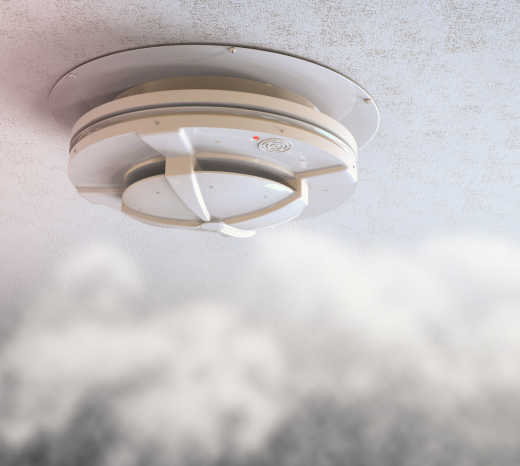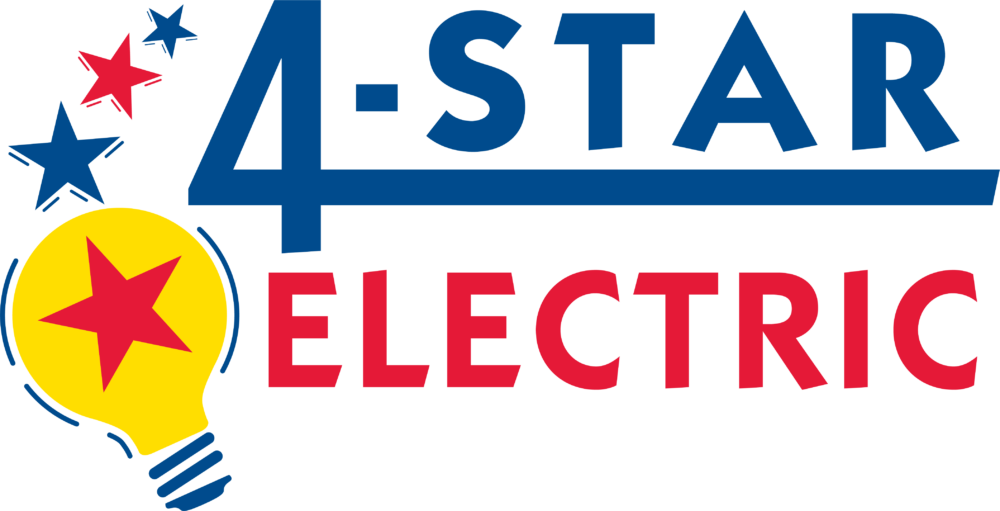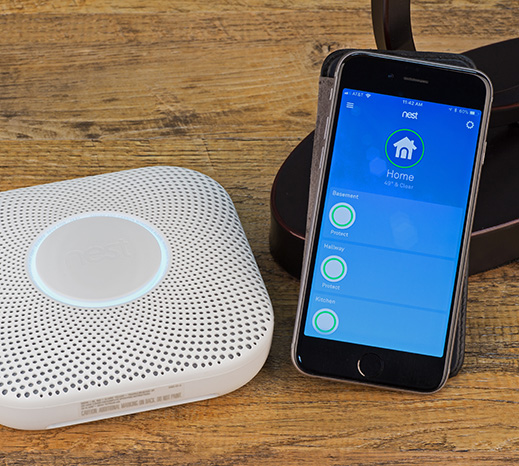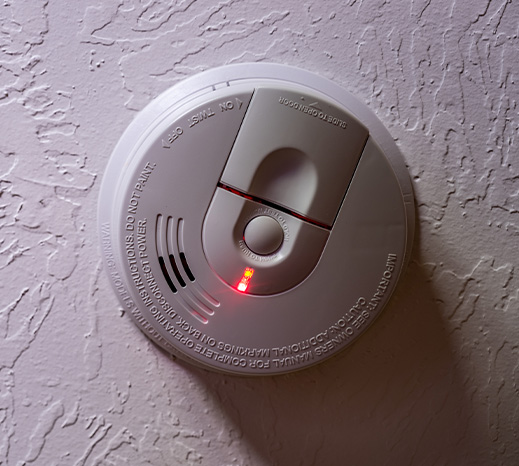4-Star Electric is Alberta’s premier choice for proper smoke and CO detector installation, placement and service.

While your Calgary and Area home probably already has smoke and CO detectors installed, it might not be enough to protect your home and your loved ones. Did you know that placement is just as important as having them?
In today’s blog, the experienced electricians at 4-Star Electric will go over the importance of not only proper placement, but professional installation and ongoing service to ensure your electrical fire safety system remains running trouble free, and your home is protected.
The Importance Of Proper Smoke & CO Detector Placement
Exposure to smoke and CO (carbon monoxide) can cause nausea, dizziness, fatigue, respiratory issues, and even death. So having properly working detectors is crucial to maintain health and safety.
Both traditional and smart smoke detectors work the same way, and come in two types: ionization and photoelectric.
Ionization smoke detectors are found in the majority of Calgary and area homes. This type of smoke detector uses ionized particles to detect smoke in the air. Photoelectric smoke detectors use a light sensor instead of particles to detect smoke. Once the smoke enters the device, it blocks the alarm’s light sensors, triggering it.
CO detectors work through the use of electrochemical sensors that constantly measure the concentration of CO in the air. The alarm will sound once levels reach a certain level. These detectors are designed to go off before levels get to a critical level, allowing ample time for your family to get outside before side effects occur.
Proper placement of your home’s smoke and CO (carbon monoxide) detectors directly impacts their effectiveness. Incorrectly placed alarms can lead to missed alerts, incorrect readings and false positives.

Common Detector Placement Mistakes
Here are some of the most common smoke and CO detector placement mistakes we’ve seen over the years.
- Too close to the kitchen
- Not enough detectors in the home
- Too high or too low
- Too close to the fireplace
- In bathrooms
- By windows that get a lot of sun
- Not having detectors interconnected
Kitchen, bathroom and other sunny locations can produce lots of steam and humidity which can interfere with sensors. While detectors that are placed too high or too low can miss trace levels of irritants, not giving you enough time to safely exit the premises.
Finally, like we briefly touched on above, not having hardwired or interconnected alarms is dangerous as someone might not hear the alarms going off if they are in a large home, in a far off area. Interconnected alarms ensure that when one goes off, they all go off.
Best Practices For Detector Placement
At 4-Star Electric we’re your go-to, trusted source for smoke and CO detector installation, inspections and service. Here are our team’s top tips for detector placement.
- Smoke and CO detectors on every level of your home, outside of sleeping or high traffic areas.
- Smoke detectors in each sleeping area or bedroom.
- Maintain proper distance from fuel-burning appliances and high-humidity areas.
- Avoid placing detectors too close to vents or fans that can change the flow of air and the detectors ability to detect hazards.
Why Professional Service Matters
Hiring professionals is key when it comes to your home’s electrical and fire safety systems. They ensure proper wiring, strategic placement and even integration into your home’s existing systems.
Here’s what you can expect when you call in the experts at 4-Star Electric.

Evaluation
Every installation or system inspection begins with a comprehensive evaluation where we’ll evaluate your home’s layout to determine the optimal locations for your smoke and/or CO detectors. We’ll focus on areas such as bedrooms, hallways, and near potential CO sources such as your furnace.
If you already have alarms installed, your electrician will check the age, condition and functionality looking for signs of outdated units, improper placements or non-functional components.
Your electrician will also go over any local building and electrical codes to ensure your equipment meets the required standards.
Recommendation
All detector recommendations are thoroughly explained and will go over equipment options such as hardwired, battery and inter-connected systems.
Your electrician will also provide guidance on the number of detectors needed to maximize safety.
Finally, a detailed cost and timeline estimate will be provided so you can prepare for your service.
Service
The installation area is prepared by outlining the chosen locations for each detector, ensuring access for electrical connections for hardwired units, and setting up tools and materials.
Your electrician will efficiently install the detectors in their recommended locations, following manufacturer guidelines. Hardwired units will be connected to your home’s electrical system, while battery powered units are securely mounted. If we’re installing an inter-connected system for you, we’ll make sure that all detectors are properly linked.
After installation, your electrician will test each unit to ensure it’s working properly. They will also suggest regular maintenance tips including how often to test your equipment and how and when to change the batteries.
Finally, the work area will be cleaned and your old detectors and packaging will be removed.
You can have total confidence in our team.
The Importance Of Regular Electrical Inspections
Regular professional electrical inspections should be a part of your checklist, as it’s one of the best ways to protect your home from the risks of electrical fires. Plus, they’re often required for insurance purposes during renovations, buying or selling a home, or when installing major electrical appliances.
Protect your safety with a thorough electrical inspection from 4-Star Electric today!
We hope you’ve taken away some valuable information on the importance of smoke and CO detector placement and service.
4-Star Electric has trucks on the ground in Calgary and the surrounding areas, paired with our industry leading workmanship guarantees, our electricians are ready to provide high-quality electrical service, including smoke and CO detector installation.We only install the most trusted equipment and we’re proud to offer industry-leading repair and replacement guarantees, as well as 100% satisfaction guarantees. Call us today to schedule yours.
Frequently Asked Questions
How often should I replace my smoke detectors?
Smoke detectors should be replaced once every 7-10 years depending on the detector to ensure safety. Up to date detectors are also required by insurance companies in the event of a fire. If you’re not sure how old your current equipment is, give the experienced team at 4-Star Electric a call to conduct an inspection.
How many smoke detectors do I need?
The number of detectors you need depends on the size and layout of your home. We typically recommend a minimum of one smoke and one CO detector per floor and they should be placed outside of each sleeping area in a hallway. Also, one smoke detector in each sleeping area or bedroom.
Why is my smoke detector beeping?
Oftentimes, a beeping smoke detector means that the battery is running low. Most modern units are designed to keep a residual charge for several days, so the beeping may continue even after the battery has already gone dead. If you’ve already replaced the battery and the beeping continues you may have an electrical malfunction somewhere else in the system, so give us a call and we’ll quickly diagnose and address it.
Do I need to hardwire my smoke detectors?
Yes, all smoke detectors should be hardwired and have a working battery to ensure safety. This double power source ensures your alarms will continue to function in the event of a wiring or battery failure. Hardwiring your smoke alarms also allows them to communicate with each other no matter where they’re located in your home.


